A non-periodical newsletter issued by Technology and Law Community “Masaar” on news and activities related to digital rights in Egypt.
Subscribe on “Wasl” newsletter
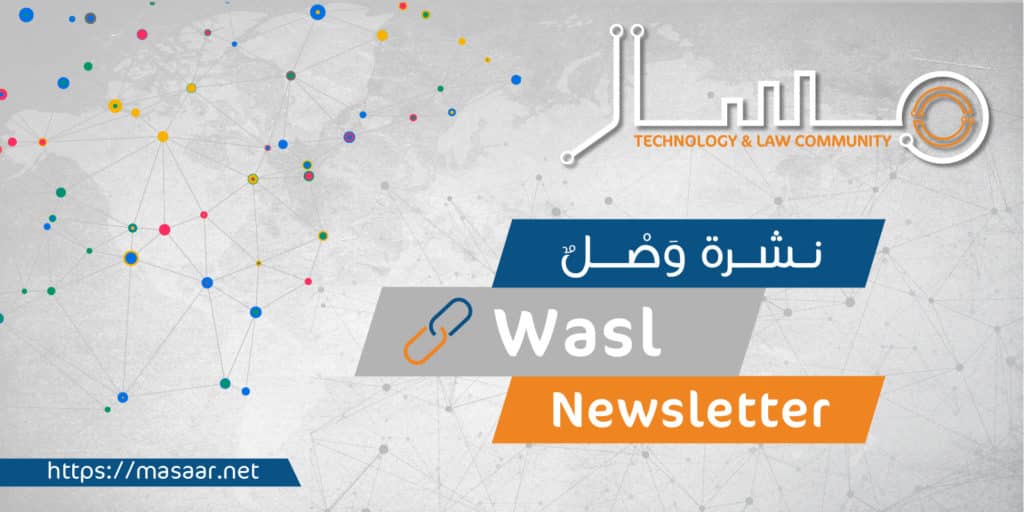
31 States Condemn the Deteriorating Situation of Rights and Freedoms in Egypt
On 12 March 2021, 31 states at the United Nations condemned the deteriorating human rights situation in Egypt through a statement delivered by Kirsti Kauppi, Finland’s ambassador to the United Nations in Geneva, during the forty-sixth session of the United Nations Human Rights Council. The signatories states included most of the European countries, in addition to the United States of America, New Zealand, Canada and Australia.
The statement focused on the deteriorating human rights situation in Egypt, especially the restrictions imposed on freedom of expression and the right to peaceful assembly, and the constrained space for civil society and political opposition and the application of the anti-terrorism law against peaceful critics. The statement also focused on the situation of Egyptian civil society organizations and the NGO law in Egypt, and the prosecutions that human rights defenders are subjected to, such as imprisonment and travel bans.
The signatories to the statement called on the Egyptian government to lift restrictions on media and digital freedoms, to stop blocking press and media websites, and to release all imprisoned journalists.
The statement also expressed the concern of the signatory states about the application of the anti-terrorism law against human rights activists, LGBT persons, journalists, politicians and lawyers, and called for an end to the extended pre-trial detention of activists and human rights defenders. The statement also expressed the concern of the signatory states about the multiple abuses during the trials, including limiting the ability of lawyers to meet with their clients and preventing them from accessing evidence.
Masaar Joins Supporters and Partners of Palestine Digital Activism Forum 2021
7amleh – The Arab Center for the Advancement of Social Media launches the fifth edition of Palestine Digital Activism Forum 2021 (PDAF). The forum will be held from March 29 to April 1, 2021, and it will discuss many topics related to rights and freedoms on the Internet, including censoring critical and dissenting speech, collecting and storing the public’s private data and the use of espionage, surveillance and tracking technologies.
Masaar – Technology and Law Community joins supporters and partners of Palestine Digital Activism Forum 2021, and participates in the forum through two events:
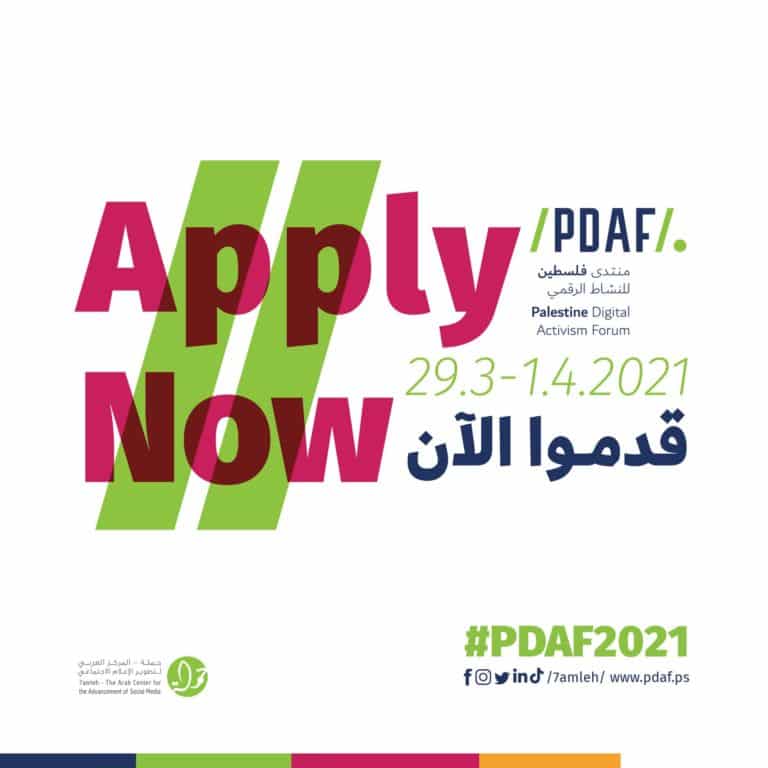
- The first is Data Protection in the Arab Region session, and it sheds light on privacy and data protection in the Arab region, providing examples from Egypt, Jordan and Palestine to showcase the fate of the citizens’ right to privacy and data protection.
- The second is Digital Security Solutions for Organizations and Individuals that Rely on Open Source workshop, and it focuses on communication between teams and individuals, building collaborative work platforms on the Internet, and securely sharing and storing files based on open source programs.
Links:
- Palestine Digital Activism Forum website (You can register to join the forum form the website)
- PDAF Agenda
- 7amleh on Twitter
- 7amleh on Facebook
- 7amleh – The Arab Center for the Advancement of Social Media website
Connect.. Masaar Launches a New Section on its Website
Masaar – Technology and Law Community launched on its website a new section with the name “Connect”, to feature articles and present a podcast on technology and law. The content published in this section will be based on questions and consultations received by Masaar.

This section will provide responses to questions and consultations through articles and a podcast. The content published in Connect will cover topics related to technology and law, including topics related to freedom of expression, privacy on the Internet, digital security, media freedom and freedom of Information on the Internet.
Follow Connect through the following links:
- Connect on Masaar website: Arabic | English
- Connect Podcast: Anchor | Google Podcasts | Apple Podcasts
- Masaar on Facebook
- Masaar on Twitter
- Masaar Mailing List
Publications on Rights and Freedoms on the Internet
Personal Data Protection Law: Does it Really Aim at Bolstering the Right to Privacy?
Masaar – Technology and Law Community, has published a commentary paper on the Egyptian Personal Data Protection Law. This Massar commentary is written amidst an incomplete legislative context since the Egyptian government is still to issue the executive regulations of the law.
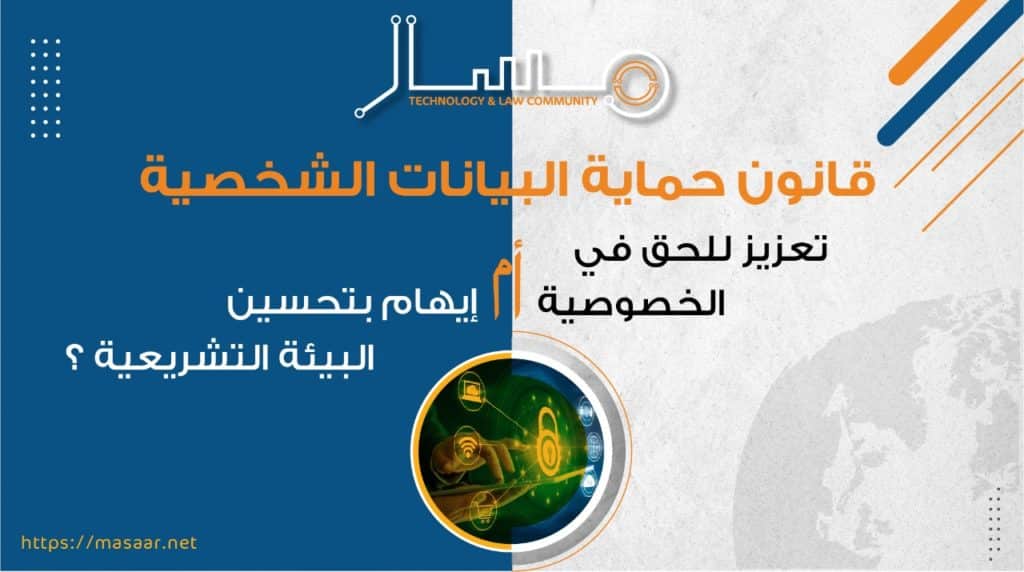
The coming period might also witness the formation of the Personal Data Protection Center (PDPC) and its different committees. Hence, this commentary focuses on analyzing the most important articles of the law, noting on some of their legal formulations. It will also review the legislative context in which the law was endorsed, and the aims pursued by the legislator in issuing it.
The review carried out by this commentary bases itself on three sources and manuals: the parliamentary reports issued by the communications committee during the discussions of the draft law, the explanatory memorandum accompanying the government-proposed draft law, and the standards pertaining to the formulation of data protection laws stated in “The Legislator’s Manual to the Personal Data Protection Law” issued by Access Now organization.
2. A Comparison between Privacy and Security Provided by Instant Messaging Applications
Masaar and SMEX published a comparison of the privacy and digital security features offered by some of the most used messaging apps. In the context of the two organizations’ efforts to provide information on how technology companies handle user data, as well as their privacy and security practices, they published this comparison, which focuses on popular apps such as: WhatsApp, Facebook Messenger, Signal, Wire Telegram, Jitsi, iMessage, Skype, Zoom and Instagram.
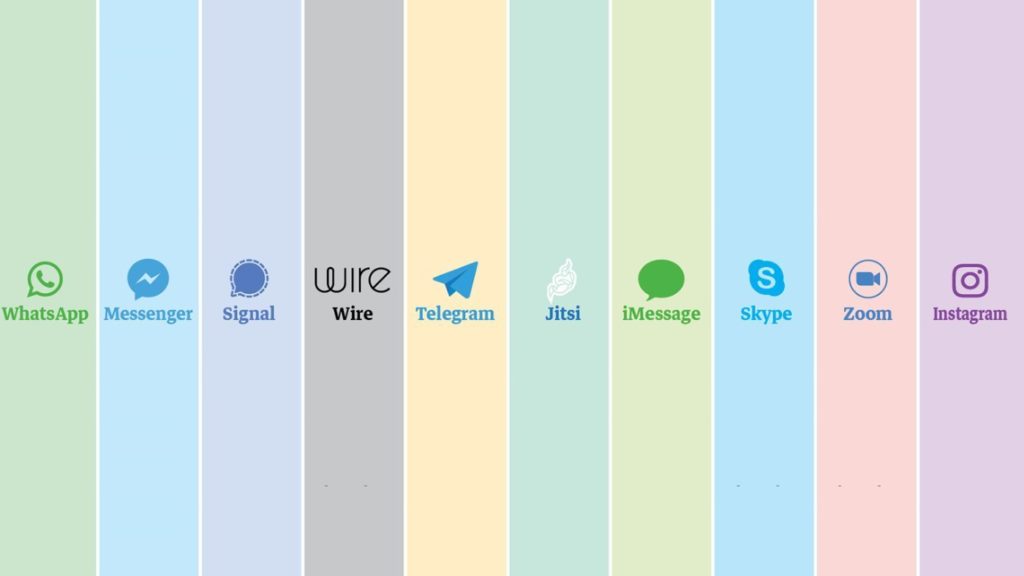
Comparison’s Links: Arabic | English
3. Internet Censorship Events in Egypt [timeline]
Masaar – Technology and Law Community published a timeline that provides an overview for the most important Internet censorship events from 2010 to date. It focuses on the measures and decisions taken by the Egyptian authorities to control the Internet or prevent its users from communicating with each other through attempts to block instant messaging applications such as Signal and Wire.
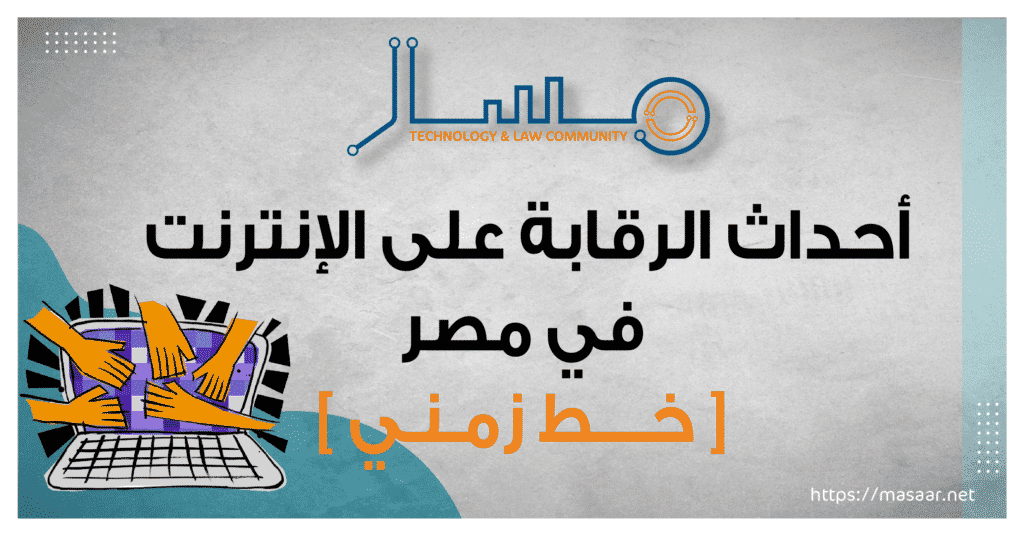
The timeline also presents the most important legislative developments related to the Internet and cases heard by Administrative Courts, including the blocking YouTube case and the case of cutting off communications. In addition, the timeline lists the events of Internet censorship that coincided with demonstrations in Egypt (e.g., the demonstrations of 20 September 2019).
Masaar has published this timeline as a webpage on its website and will update it regularly.
Webpage Links: Arabic | English
4. A Continued Isolation… The Annual Report on The State of Freedom of Expression in Egypt in 2020
The Association for Freedom of Thought and Expression (AFTE), published it’s annual report on the state of freedom of expression in Egypt That reviews the state of digital rights, media freedom, creativity, academic freedom and student rights during the pandemic, highlighting the features of withholding information and how the pandemic has turned into another pretext for violating rights and freedoms.
The report includes two main sections, the first focuses on the Covid-19 impacts on freedom of expression in Egypt, by examining the conditions of information circulation, higher education, creativity, as well as the conditions of those detained in cases related to freedom of expression during the pandemic in 2020. The second section provides a review and analysis of the key patterns of violation of digital rights, freedom of creativity, media freedom, academic freedom and student rights, as well as the right to peaceful assembly.
5. Q&A About Your Digital Security
The Arabic Network for Human Rights Information launched a paper on protecting the digital security of individuals. The paper provided some tips and instructions to increase the digital security of users, increase the difficulty of hacking accounts, and reduce the threats of hacking them.
Link: Arabic
New in “CONNECT” Section on Masaar Website
In “Connect” section on Masaar website, the team posted:
1. CONNECT Podcast| Episode (1)| Information Technology and Telecommunication Laws in Egypt
The first episode of Connect Podcast provides an overview of the most important laws related to the information technology and telecommunication sector in Egypt, such as the Telecommunications Law, the Anti-Cybercrime Law and the Press and Media Regulation Law.
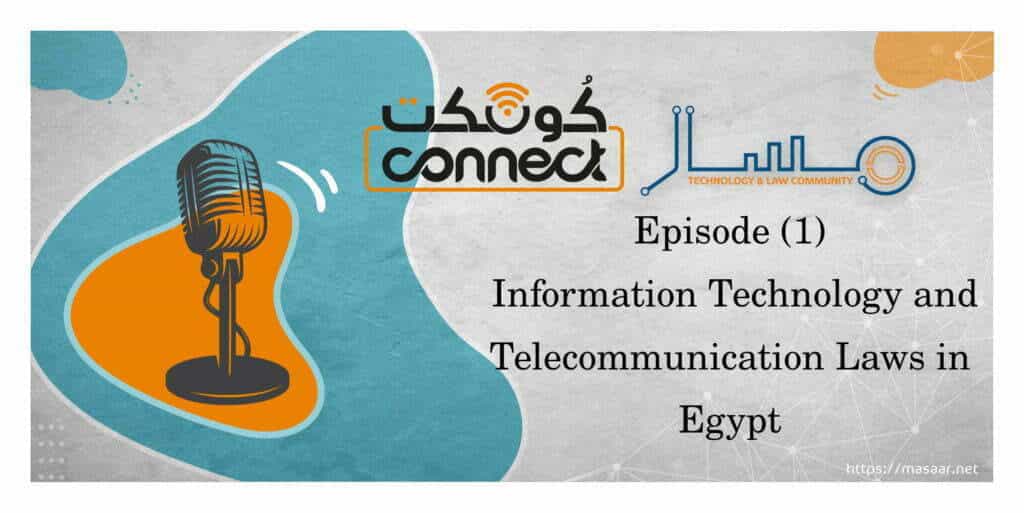
Podcast links: Apple Podcasts | Google Podcasts | Anchor
2. The Legality of Accessing Blocked Websites and Using Web Proxy Servers
A number of internet users in Egypt have approached Masaar with a number of questions regarding blocking and encryption. These questions were mostly about some of the restrictions imposed on accessing some websites, the incrimination of having a software with intent to commit a crime, and the possibility of having a web proxy server being a crime.
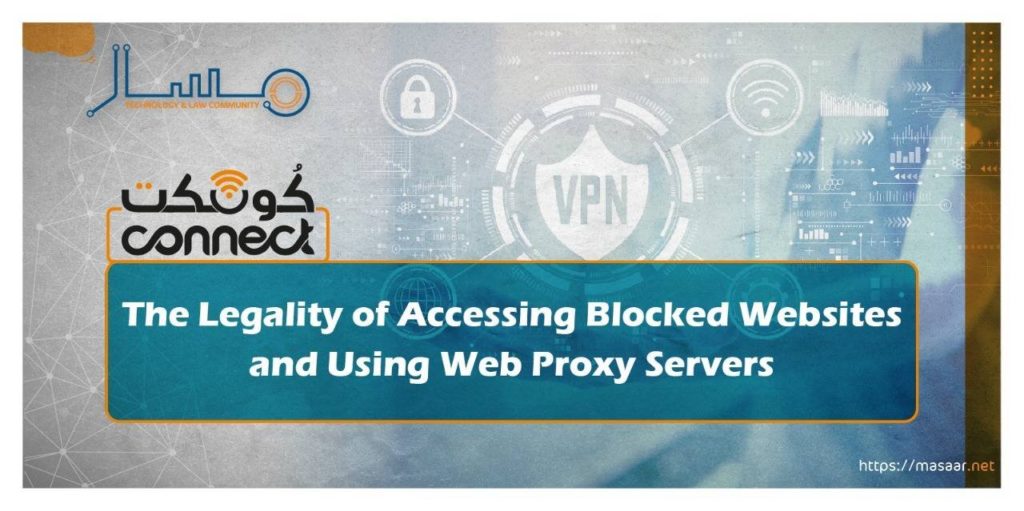
Therefore, this article addresses the difference between the crime of illegal access on one hand, and using web proxy servers on the other. The article also touches upon the service provider’s responsibility for the blocking, and the legality of having and using web proxy servers like VPN.
Articles
1. Those Events| What Regimes Did to the Internet
On the tenth anniversary of January 25 revolution, “Al Manssa” published an article about how successive regimes in Egypt since 2011 have expanded their practices to control the Internet and telecommunications, especially after the protests of June 30, 2013, as dealing with the Internet became more severe with the introduction of new laws that violate rights and freedoms on The Internet, and the expansion in the use and import of technologies for Internet and communications surveillance and blocking websites, without losing sight of the increasing prosecution of activists on the Internet.
Link: Arabic
2. «Blocking YouTube».. 8 Years in Courts
On January 24, the Administrative Court issued its ruling in the lawsuit to block YouTube in Egypt, which concluded to the cancellation of the negative decision of the Supreme Council for Media Regulation to refrain from blocking links that display the film offending the Prophet on YouTube. “Mada” published an article about the judiciary’s approval of a protective function for the Supreme Council for Media Regulation, how the ruling is implemented by the authorities, and legalizing censorship on the Internet.
Link in Arabic: Mada Website | Masaar Website
Press Releases
- Statement from global civil society on the impact of Facebook, Google and Twitter: Concern for democracy and human rights must not end at the US’s borders. Link: English
- Open Letter to Facebook, Twitter, and YouTube: Stop silencing critical voices from the Middle East and North Africa. Link: English
- He posted it himself “I’m getting arrested”, so will the Public Prosecutor take action? Prominent cartoonist Ashraf Hamdy arrested. Links: Arabic | English
